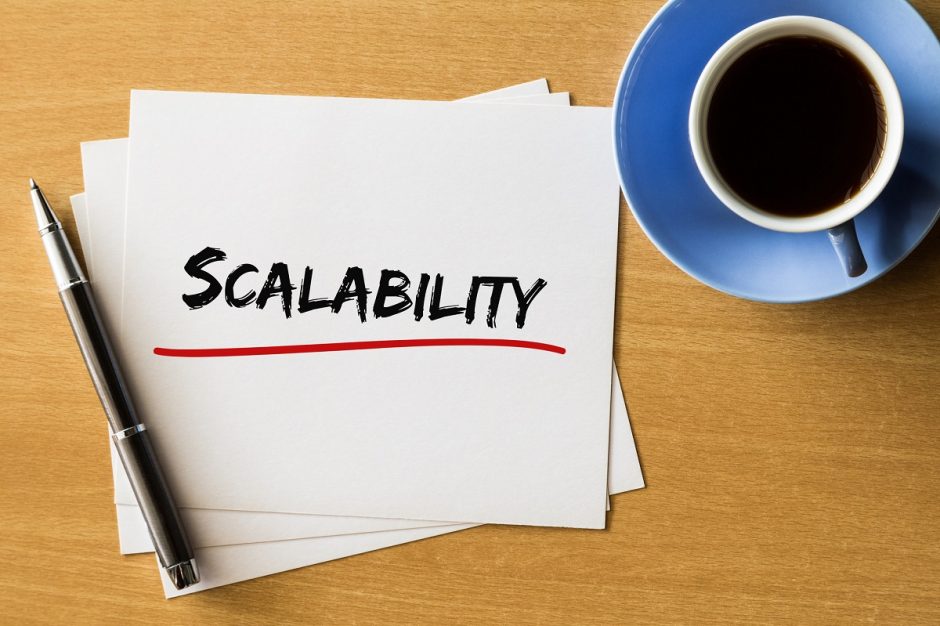103% year over year growth in just three years! When you see growth like that, you can’t help but wonder how your business could do something like that.
This growth belongs to one of our business neighbours here in Melbourne, JV Recruitment. They are one of the fastest growing companies in Australia. They have clearly built a scalable business.
If you want to prepare your own company to scale, you need to know what’s needed to have scalability in business.
The Four Keys to Make a Business Scalable
These are factors that will take a business and grow it at scale.
1. Growth
This is the ability to increase profitability over time. This goes beyond normal costs and income growing at similar rates. The money made early on is used to create new ways to profit.
2. Demand
A wonderful service or solution that no one is asking for will fail. To scale, you need to know that there are customers ready to pay you today.
You also should know that what is happening with your competitors. They may encounter problems first, and you can maneuver around the pitfalls in your market as it grows.
3. Costs
The lower your costs for goods or services, the greater the chance you have to scale. Increasing your profit margins will push your growth into the next level. Your strategy should include reduced costs as you increase revenue.
4. Structure
The systems, tools, management, and processes should be built to handle growth. The business should not be too dependent on one system or too few people.
Some businesses can reach a point where they realize they are not built to scale up, but only when it’s too late. Choosing the right organizational structure will allow you to grow and shift quickly.
How to Build a Scalable Business
With a firm grasp of these factors of scaling, you are ready to plan. In every area of your business, take time to see how these factors can be applied.
Scalable business ideas require a lot of planning and strategy to execute well. It’s best to have these ideas worked into the foundation of your business, but you can also work these into an established venture.
Changing your business processes or structure, later on, is more difficult, but it will open up more roads for success.
Here’s how to prepare for the scale-up.
Get Your Tools Ready
Invest early on in systems that can grow without requiring expensive shifts later. The latter can result in huge obstacles. This could stunt your company’s growth or cost you time-sensitive opportunities.
Consider things like e-commerce platforms, billing tools, and CRM systems. You want as many tools and systems that can be automated.
It’s always a good idea to take inventory of the repetitive tasks in your business. Begin looking for ways to put those tasks into autopilot.
Automated messages to customers during an online buying process is one great example of a time saver. There are many tools to help you automate your business. And we can expect more every year as AI continues to affect how we work.
It pays to stay up to date on what is available to you.
Build With Scaling In Mind
When starting out, resist the cheapest options. Yes, cash can be an issue when you are first starting your business, but it pays to think ahead. Instead of going with the most cost-effective options, be forward-thinking and build what will serve you later.
Try to find systems that can work together instead of a random collection of disconnected tools. If your systems cannot pass information back and forth easily, they will require more manual hours of inputting data.
A large part of scaling in business is collecting feedback. Seek out feedback from all of your team or organization and customers.
This is a practice that many have adapted from Google. The Google Venture Design Sprint uses all that new feedback and lets you put it to use.
Here’s how to run your own design sprint:
- Understand: What is the problem you are solving? Who is involved in it? What strategies could be used?
- Diverge: Get all the ideas about the issue down. There are no bad ideas. Your goal here is just to ideate.
- Decide: Choose the best idea. Storyboard what that would look like.
- Prototype: Build it quick. Let people in your organization try it. It doesn’t need to be perfect.
- Validate: Take it for a test drive with real users/customers. Learn about what doesn’t work.
Use these kinds of activities to discover or iterate something new. It also is an open process. Here, you eliminate the risk of one view from dominating the development of your business.
Plan With Strategy
Your strategy is the overarching philosophy about how you operate your business. It is an ongoing endeavour that will require time and attention.
Once you understand where you’re going, and why, you can plan better. With a solid plan, you and your team will stay focused and make the right pivots to lead you to your goals.
To stay on track, set annual and quarterly goals. Having regular times to review how your business is performing will make you address problem areas. This sort of planning and accountability to the plan will make you more successful.
Play to Your Strengths
Double down on your strengths and toss the rest of the tasks to your team members or outsource them to freelancers. When you and your team are doing what you all do best, you can achieve laser-sharp focus towards the next goal.
This also applies to your product or service. Stay close to what you know and can deliver on.
Avoid the mistake of trying to expand into other areas just because there is a potential for a bit more revenue. If you can’t deliver it well, it could have a negative effect on the perceived value of your best products.
You Need Patience for a Scalable Business
Persistence and time will break through your obstacles. As long as you are flexible and learning the whole way. Slow and steady growth is much more sustainable than rapid growth. You have time to stretch and adjust.
Ready to Scale?
Do you plan to seek funding from investors? Your ability to build a scalable business will be one of the main factors they will consider.
Are you having a profitability issue? It may be that you’ve outgrown your business model. You could be experiencing a plateau. Shifting to a scalable business structure will help you break into the next level.
Not sure what to do next? Not sure if you have a scalable business model? We can help with that. You can book a Strategic Cash Flow Audit to have our team identify where your biggest opportunities are.











